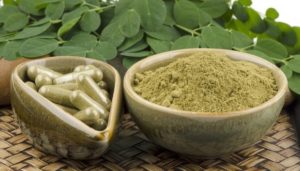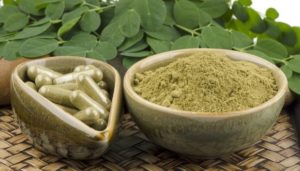 There’s no doubt that moringa is a superfood, packed with nutrition and antioxidants. In fact, we love mixing one of our favorite organic moringa powders in a smoothie every morning. And there are tons of great health benefits, but there are moringa side effects you want to know about before you start using it regularly.
There’s no doubt that moringa is a superfood, packed with nutrition and antioxidants. In fact, we love mixing one of our favorite organic moringa powders in a smoothie every morning. And there are tons of great health benefits, but there are moringa side effects you want to know about before you start using it regularly.
Moringa is a natural laxative
The most common moringa side effect is diarrhea. This is because moringa is a natural laxative. Although this is a good side effect for some people, it may be an issue for people with existing conditions such as IBS.
Some people may experience related symptoms, including bloating, increase flatulence, and general digestive discomfort.
If you experience diarrhea while using moringa, the best option is to reduce or cease your dose until your symptoms go away.
In order to prevent this side effect, the key is to start slowly. Introduce a small dose and see how you react, and gradually increase over time.
Moringa is potentially unsafe during pregnancy
The main contraindication for moringa is pregnancy. There are known chemicals in the root, bark, and flowers of moringa that can stimulate the uterus. This is a major risk for miscarriage.
Although there is no known evidence that moringa leaf is dangerous for pregnancy, the safest option is to avoid use of all moringa products during pregnancy.
Similarly, there is no evidence to suggest that moringa can cause issues during breastfeeding. In fact, some research even suggests it may aid in increasing breast milk production. However, due to the lack of proof that it is safe, experts recommend you avoid use during breastfeeding.
If you do decide to use it during breastfeeding, it’s essential that you notify your healthcare practitioner. This way, they can monitor you and your child to make sure nothing goes wrong.
Moringa has a poisonous root
 You might be interested in moringa side effects. However, you may not know that in some cases, moringa is toxic. In fact, it can even cause paralysis and death. But it’s important to know the truth behind this.
You might be interested in moringa side effects. However, you may not know that in some cases, moringa is toxic. In fact, it can even cause paralysis and death. But it’s important to know the truth behind this.
The root, and extracts from the root, are the concern. They contain a toxic substance called spirochin. Spirochin can actually paralyze human nerve cells. This can cause paralysis of the body, which can then lead to death.
However, the majority of moringa supplements do not include the root. You can easily avoid this issue by reading the product before purchase. Most will list the exact parts used in the supplement.
Do not use any products that contain root or root extract, or do not list the breakdown of moringa parts used.
The Bottom Line – Don’t consume the root or root extract and start slow
The deadliest moringa side effects occur when someone uses root or root extract. That’s why we recommend only using moringa leaves and fruit.
To avoid lesser side effects, such as digestive upset, start at a low dose and slowly increase to your preferred dose.
Moringa is not recommended during pregnancy and breastfeeding, as it is not proven to be safe. It may even cause miscarriage during pregnancy.
If you’re not certain whether these moringa side effects may apply to you, please consult your health professional before using moringa.
If you’ve come across any more side effects, please share in the comments below!
References
http://www.webmd.com/vitamins-supplements/ingredientmono-1242-moringa.aspx?activeingredientid=1242
http://citeseerx.ist.psu.edu/viewdoc/download?doi=10.1.1.461.864&rep=rep1&type=pdf
https://www.ncbi.nlm.nih.gov/pmc/articles/PMC3336641/
https://link.springer.com/article/10.1007%2FBF02887070?LI=true

